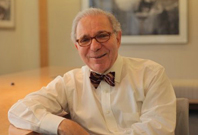 All strategic philanthropists have beliefs that anchor their philanthropic journey and power their actions. For Roger Hertog, President of the Hertog Foundation, Chairman of the Tikvah Fund, and former chairman and President of investment firm Sanford C. Bernstein & Co., Inc., his beliefs center on the power of ideas. "It isn't just that ideas matter more than any other aspect of life; they have the longest-lasting consequences," says Hertog. Of his philanthropic motivations, he says, "I was interested in the questions that shaped our larger society—questions in terms of education, national security, public policy, economics, and religion—questions that would enhance the quality of life for the largest number of people."
All strategic philanthropists have beliefs that anchor their philanthropic journey and power their actions. For Roger Hertog, President of the Hertog Foundation, Chairman of the Tikvah Fund, and former chairman and President of investment firm Sanford C. Bernstein & Co., Inc., his beliefs center on the power of ideas. "It isn't just that ideas matter more than any other aspect of life; they have the longest-lasting consequences," says Hertog. Of his philanthropic motivations, he says, "I was interested in the questions that shaped our larger society—questions in terms of education, national security, public policy, economics, and religion—questions that would enhance the quality of life for the largest number of people."
Hertog's interest in the profound began as a young boy living in the Bronx. The son of German Jewish refugees, most of Hertog's extended family died in the Holocaust, a fact that prompted the young Hertog to ask hard questions. Why were 6 million people allowed to die? Why was he spared when so many family members were not? He turned to his local library in his search for answers and reveled in both the mental and emotional sustenance he found there. "Libraries saved and made lives," he says. "Libraries were the truly great democratic institution in America—all I needed was a card."
To ensure that today's underserved youth have their own such haven, Hertog made a multimillion-dollar gift to build the Bronx Library Center. Opened in 2006, the Bronx Library Center, which houses extensive collections of both print and non-print materials and is the largest public library in the Bronx, serves an important role for the borough with the highest poverty and unemployment rate. Hertog has also given money to a wide array of other organizations and ventures that honor the power of ideas. To name just a few: He's funded think tanks, such as the Manhattan Institute for Policy Research; cultural institutions, including the New-York Historical Society; educational initiatives, like the Hertog Global Strategy Initiative, a research program at Columbia University that uses historical analysis to confront problems in world politics; journalistic ventures, such as the nonprofit National Affairs and Commentary; and a myriad of projects, programs, and individuals to promote Jewish thought.
Like many remarkable philanthropists, Hertog approaches his giving with business savvy. "Anyone who's been great at business knows that some of the most successful things they've done didn't start off like a barn burner when they began," he says. Though he cautions that it would be foolish not to keep watch on what's happening in the shorter term, Hertog believes philanthropists also need vision and patience: "One has to recognize [philanthropy] is a long-term endeavor."
Taking the long-view on results is not the only way Hertog applies business strategy to philanthropy. "When one starts in any business endeavor, the questions are usually the same, whether it's a manufacturing business or a service business—or philanthropy," he says. To create effective philanthropy, Hertog believes you should ask yourself the same kinds of questions you would ask at the outset of a business venture, for example: What vacuum in the market are you filling with your investments? Why do you think you're particularly good at this? What would you like to accomplish over the next five or 10 or 15 years? "Small mistakes at the beginning have enormous significance," he says. "You shouldn't be overly cautious, but you ought to be humble about seeing what you have to do."
See a complete archive of Roger Hertog' videos.
Roger Hertog's Key Insights for Philanthropist
- Start small and build. Watch: A strategy that has “served us well”: Roger Hertog says starting small and building over time has worked in his philanthropy.
- Lay out expectations at the start. Watch: Roger Hertog advises both donors and grantees to lay out expectations at the start.
- Have a little patience and vision. Watch: “A long-term endeavor”: Roger Hertog advises philanthropists to “have a little patience and vision” when seeking philanthropy’s results.
- If it’s not working, get creative. Watch: Adaptive strategy: An initial Tikvah Fund strategy didn't work, so Roger Hertog got creative—and got results.
- Find the right people to help you. Watch: Know what you want to fund? Now, says Roger Hertog, find someone who cares.


